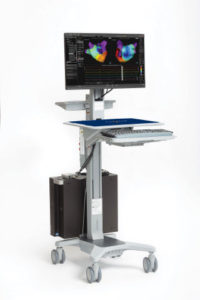
Acutus Medical has announced the completion of the first patient procedure in the UNCOVER-AF (Utilising novel dipole density capabilities to objectively visualise the etiology of rhythms in atrial fibrillation) clinical study. The study is evaluating the incidence of device and procedure-related safety, effectiveness and efficiency using the AcQMap high resolution imaging and mapping system to guide ablation in persistent atrial fibrillation patients. Acutus Medical received CE Mark approval for the AcQMap system and AcQMap catheter in May 2016.
Patients are currently being enrolled in the UNCOVER-AF clinical study at electrophysiology centres of excellence throughout Europe and Canada. The first procedure was successfully completed by Andrew Grace and Sharad Agarwal at Papworth Hospital in Cambridge, UK. Grace says: “The AcQMap system ushers in a new standard of care allowing electrophysiologist who until now, have never been able to fully visualise all the electrical mechanisms combined with the functional mechanism of atrial fibrillation. Being able to truly see each heart beat in real-time, with CT quality imaging and full-chamber electrical-conduction maps has the potential to more accurately inform treatment decisions and improve patient outcomes.”
The AcQMap System combines a real-time CT quality anatomy with an ability to map the electrical-conduction of each heartbeat to precisely visualise electric sources across the entire chamber thus enabling the pinpointing of sites crucial for driving and maintaining atrial fibrillation. Following guided treatment, the next heartbeat can be remapped in seconds to confirm successful ablation and define additional treatment, if needed. This progressive treatment strategy of mapping, ablating and remapping to systematically break down the complexity of the atrial fibrillation frequently leads to spontaneous termination with conversion to sinus rhythm.
Early clinical results using the AcQMap system have demonstrated accurate left atrial reconstruction when compared with CT/MRI and dipole density mapping offering a significantly higher resolution than voltage-based mapping.












